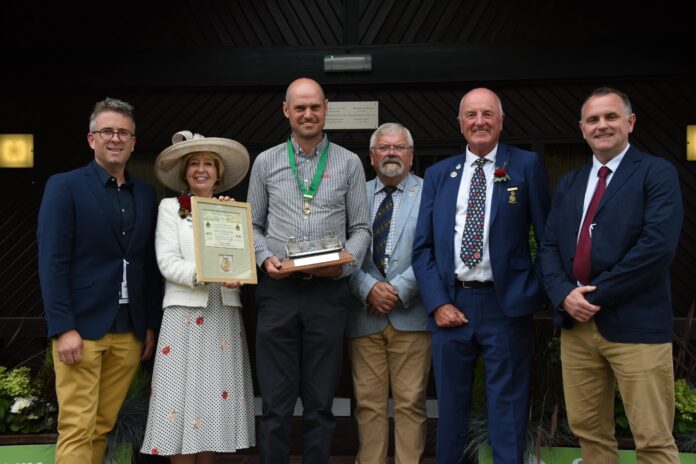
As the Royal Welsh Agricultural Society’s flagship accolade, the Sir Bryner Jones Memorial Award is highly coveted every year.
The winner of the 2023 award was kept under wraps until the opening day of the Royal Welsh Show (Monday 24 July), creating a sense of excitement and anticipation that befits such a prestigious award.
Sir Bryner Jones helped shape the direction of the Royal Welsh Agricultural Society for fifty years. He was head of the Department of Agriculture and Aberystwyth College in 1907 and went on to be one of the leading agricultural education figures in Wales. He was a person of influence in Welsh Agriculture, becoming both Commissioner and Chair of the Agricultural Council for Wales and subsequently became Welsh Secretary of the Ministry of Agriculture.
Sir Bryner Jones, who received a Knighthood in 1947, was the Royal Welsh Honorary Show Director from 1908 to 1910 and was the Society’s Chairman of Council from 1944 to 1953. He became the Society’s President in 1954, in the society’s 50th year.
Since 1957 the award has been made annually to someone from a different area of the farming industry who has reached the highest level of achievement in the chosen sector. This year the judges were looking for an individual who has successfully implemented innovations and techniques towards achieving Net Zero within their farming business.
With all three shortlisted finalists, and their families eagerly awaiting to hear who had won, the Society’s President, John Homfray announced that the winner of the 2023 Sir Bryner Jones Memorial Award is Edward Vaughan of Sychtn, Llanerfyl, Welshpool.
Edward has created a hugely successful farming enterprise with renewables. He erected a wind turbine in 2014 and then an anaerobic digester in 2015. His work involves the regular planting of new hedges and trees and exporting surplus electricity to work towards sustainability and efficiency.
To support their choice of Edward Vaughan as the winner of the 2023 Sir Bryner Jones Memorial Award, judges Tom Allison (RWAS Board Member) and Alex Lockton (RenewEV) presented their report of the work carried out;
“The renewables employed are a 225kW wind turbine and a 250kW anaerobic digester fed with 90% waste and only 10% grass from his fields. This high proportion of waste shows strong circular thinking, and results in minimal use of his grassland for the AD plant.
Edward collaborates with his neighbouring farms and takes waste from local chicken producing farms to feed his AD plant and turns that into electricity and digestate. The digestate is used as fertiliser on his farm which means he is self-sufficient in terms of fertiliser inputs into his grazing land for his livestock. This is a circular process that provides local synergy with his local farming community to help them recycle their waste.
The electricity sold by his renewables is sold to the local community via an Energy Local scheme whereby an electricity supplier buys Mr Vaughan’s power and then sells it to around 100 local people and it gives them a discount on their electricity bill attributed to the amount of power they use when it is generating.
Energy Local facilitate the arrangement by supporting the community to collectively buy the power which results in them getting cheaper green electricity from a local source. An additional benefit of the community energy scheme is that it connects a local energy generator and local consumers which is more efficient for the electricity grid.
The judges understand that Edward is looking at options to continue this arrangement with either the existing supplier or a new supplier as part of the energy local scheme which could also include selling power to local businesses as well as homeowners.
Edward also takes in wood brash from local forestry which would otherwise be waste and dries it using the heat from the AD then separates and stores it for use in various forms, either to sell as fuel for biomass boilers or to include in his AD plant, creating value from another waste stream in another circular fashion.
Edward has a clear understanding of the importance of carbon reduction and has a laser-like focus on maximising waste streams to create a circular self-sufficient farming business. His livestock carbon footprint is ahead of his local benchmark groups and he is continually looking at ways to improve this. In addition to optimising his energy investments, he has planted 2000m of new hedges and fenced off 10 acres of peat bog to separate from livestock use to enhance the carbon sequestration potential of the farm.
Edward is creating long-term benefits in terms of efficiency of resources, eliminating bought in fertiliser, and yet feeding his soil with quality bi-product from his AD plant which will benefit the soil for future generations through the regular increase in high quality organic matter. His long term vision is to make his soil as rich and healthy as possible for his own children when they are ready to take on the farm.
In summary, Edward has made sound investments in renewables which he has selected based on a clear understanding of his farms potential and which benefit from clear synergies with his local community. These collaborations with local farms and forestry take waste product and create a product of value which he recycles through his energy technology to benefit his farm and the local community.
He demonstrates clear circular thinking in terms of waste streams and has clearly identified and fine tuned opportunities over time sharing those benefits with collaborations with neighbours. His technology on site is innovative and bold given the scale relative to the size of his farm but he has not only made this work through coloration with the community in terms of waste, but he is also sharing the output of electricity via an innovative community energy scheme which is a model that can and should be replicated far and wide.
In essence, Edward’s strategy is intrinsically long term thinking, thinking not only of his immediate farming business needs, but also those of future generations of his family and all through embedded community focused thinking. There is no doubt many other farms could benefit from hearing more about these approaches in particular the concept of collaborating with other farms to find synergies for both farm’s interests and finding solutions to waste problems but also through the community energy model which can come in various forms including one such as this but also ones where the community can help fund and own the energy asset as well.”

| [donate]
| Help keep news FREE for our readersSupporting your local community newspaper/online news outlet is crucial now more than ever. If you believe in independent journalism,then consider making a valuable contribution by making a one-time or monthly donation. We operate in rural areas where providing unbiased news can be challenging. |


















